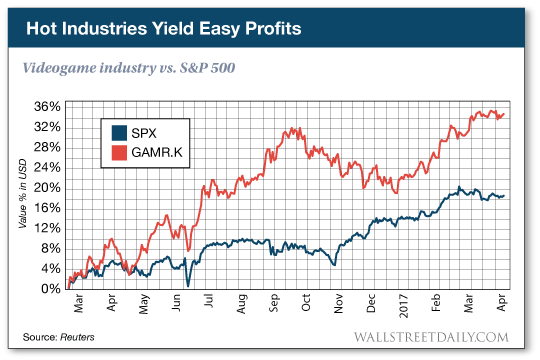Investing is easy when you’re riding a hot industry.
Heck, when every stock within a certain industry is going vertical — who could ever lose?
One such sector is the video game industry.
Notice the chart of the PureFunds Video Game Tech ETF (GAMR) below.

The fund has virtually doubled the returns of the S&P 500 over the last 12 months.
But on the heels of a bad earnings report, “experts” now believe that GameStop (NYSE:GME) just rained on the video game parade.
GameStop’s shares are being bludgeoned accordingly.
I asked my senior analyst, Martin Hutchinson, to get us the scoop.
The question I posed to Hutch is simple…
Is GameStop’s fall from grace a warning that the video game rally is over… or is GameStop simply on the wrong end (the retail end) of the profits?
Hutch’s full analysis is below.
Question: Martin, video game retailer GameStop has been beaten up lately. And the experts — and I use that term loosely — believe the company is falling victim to the online sales boom. Where do you stand on all of this?
Martin Hutchinson: It’s interesting. Jim Cramer says that GameStop is history and that video games in general are dying. But I’m not sure I buy that. We’ve talked about retailers in the last few weeks, and that brick-and-mortar retailers do have a problem with the online sales.
And that’s certainly a problem in video games, where the brick-and-mortar retailers are losing market share to digital downloads. But it’s a little bit like some of the other retailers that I think aren’t going to disappear altogether. Because game buyers, many of whom are teenage males, like to check out games before they buy them. You want to see what the thing feels like before you put out $50 to buy the thing.
Also, the video game stores have been an area where they socialize. GameStop has cut down the number of game tournaments, for example. And that’s been foolish of them, because local game tournaments are very much the best way to sell games. Buyers all turn up for these things, particularly in the fighting games area. If you hold a good local game tournament, you’re going to sell an awful lot of product.
The other problem with GameStop is that it’s become tied to consoles. But most new games are PC games or games on handhelds. Although you can’t play a good game on a handheld. Certainly, the real core gamers don’t do their gaming on a handheld much.
In the video games area as a whole, consoles have been losing market share because the new generation of consoles are too difficult to design games for. And the chips have gotten so complicated you’d have to pay $1,500 to buy a console with the latest generation of chips. You can’t sell video game consoles usefully at a $1,500 price point.
Question: Let’s take a little bit of a longer outlook on this, Hutch. What do you see next in the industry?
Martin Hutchinson: I think the U.S. video game business is splitting between very large companies and teams, which have 100 people on each new game. And they tend to lack imagination in finding new titles.
And then you’ve got a bunch of one-man shops, which can’t get the quality, because it takes more than one person to design a modern video game. So a lot of the business is moving to Europe.
Finland and Poland in particular have become nexuses of video game developers. Because in order to develop a video game business, you need a lot of developers in one place synergizing off each other. And that’s what Finland and Poland have got.
They use medium-sized teams of 10–30 developers on each game, and that tends to produce the best game.
There’s a Polish company in particular called CD Projekt Red, which is the leading Polish developer, $200 million in sales. But it’s not quoted in the United States, so Americans can’t buy it.
Question: That’s a bummer. So at the end of the day, Hutch, is Cramer right to bail on GameStop?
Martin Hutchinson: I had a look at its latest results, and I’m not sure he is. They’re moving into collectables, which are things related to the big film series. And that’s giving them another way to get customers into the shops.
They’re now 37% digital sales rather than physical boxes. And they’re going into game development in a small way themselves, which is probably a good idea because they’ve got all these people who understand them.
Their 2016 earnings per share were $3.40, and they’re only selling at about $21. They increased their quarterly dividend to $0.38 on March 1, from $0.36. So currently they have a 7% yield, and based on 2017 earnings, which are expected to be a minimum of $3.10, about a 7 times price-earnings ratio.
The company has $669 million in cash. So a 7% yield, 7 times price-earnings and $600-plus million in cash. I have to say, to me, that is something of a buy signal.
Although I wouldn’t be absolutely hellbent on that, it certainly looks quite attractive.
Question: Good stuff, Hutch. Thanks again for your time.
Martin Hutchinson: Great to be with you.
Question: This is Wall Street Daily signing off.

